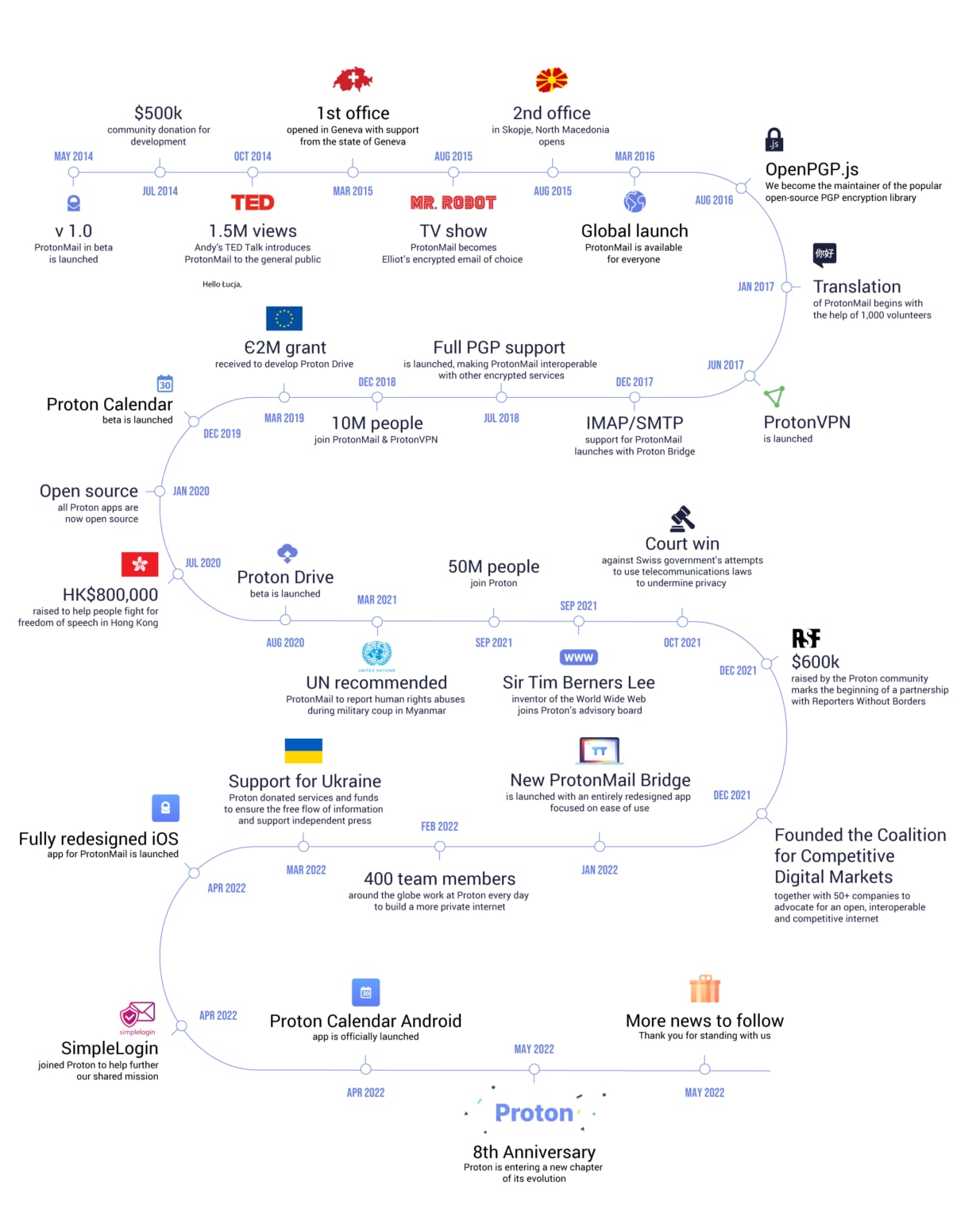This year, Proton turns eight years old. While eight years might not seem like a long time, it’s an entire era from the perspective of internet development. Proton was founded in 2014, just a few years after Facebook (now Meta) founder Mark Zuckerberg stated that “privacy is no longer a social norm”.
The fact Proton is turning eight this year and the Proton community is larger than ever proves privacy didn’t just survive, it is starting to turn back the tide of constant surveillance. The internet and the world are better off because of this. When we began our journey in 2014, we often heard, “I’m afraid to switch to a privacy service because I don’t know if it will still be around in a few years.”
Eight years on, Proton’s success has demonstrated that companies directly supported and funded by their community are resilient businesses. Privacy as a business model isn’t only possible, it’s sustainable and has enabled us to focus on meeting the Proton community’s needs.
Things that will never change at Proton
While many things have changed at Proton over the years, what’s more meaningful is what hasn’t changed. For many, Proton first entered the public consciousness when we laid out our vision at TED Global in 2014(nova janela). What is remarkable is that eight years later, Proton’s original vision has not changed and remains just as relevant today. Our goal continues to be to build an internet where privacy is the default, where every citizen of the world is in control of their data.
Just as in 2014, all basic Proton services continue to be free to safeguard the idea that privacy is a universal human right. For this reason, Proton has also made all its apps open-source. As in 2014, Proton remains independent, neutral, and user first. We believe that staying community-supported and community-driven is a core strength of Proton. It’s what makes us different and will never change even as Proton evolves with the times.
Looking back to look forward
While Proton’s core values have remained the same, the past eight years have seen fundamental shifts in Proton’s model, operations, technology, and design.
Proton’s origin at the European Center for Nuclear Research (CERN)(nova janela) is widely known, but less well-known is Proton’s start as a community-financed project. In 2014, more than 10,000 members of the global privacy community rallied together and raised over $500,000 to finance Proton’s early development. This was the start of our community-led approach. In 2016, Proton made a pivotal shift from a donation-based model to a freemium subscription model, paving the way for the long-term sustainability that characterizes Proton today.
This was accompanied by team growth and operational advances to achieve world-class reliability. Today, Proton’s mission is supported by a full-time staff of over 400 people spread across eight countries, working on diverse topics ranging from technological innovation to legal advocacy to public policy. From our headquarters in Geneva, Switzerland, to our office on the other side of the world in Taipei, Taiwan, there is always someone at Proton working to ensure that we secure your data every minute of every day.
As times have evolved and privacy demand has moved mainstream, we have also adapted Proton’s products and design to emphasize ease of use without compromising on our core encryption technology. The Proton services of 2022 are practically unrecognizable compared to where we started eight years ago, and we look forward to advancing product design even further in the future.
Looking to the future
Proton’s mission of building an internet where privacy is the default is not changing, but the challenges of tomorrow are radically different from the challenges of the past eight years. While we have grown from zero to 50 million signups, providing a private alternative for millions worldwide, Big Tech has also grown bigger than ever. Through rigging the game by leveraging their ecosystems to lock users in or preventing new internet users from discovering alternatives through self-preferencing their own services as the defaults, Big Tech today is more dominant than ever.
Big Tech is also attempting to redefine privacy. Today, the tech giants involved in the most egregious privacy violations claim to care about your “privacy”, by which they mean “nobody will exploit your data, except us”. Backed by hundreds of millions of dollars of advertising and lobbying, this fake notion of privacy is unfortunately finding some success. This leads to an internet that serves Big Tech and exploits people’s data instead of one that truly serves the interests of society.
Meeting this challenge requires reiterating the truth that real privacy means “nobody can exploit your data, period”. It also requires engaging with policymakers to ensure they pass strong competition laws that allow privacy companies to compete with Big Tech on a level playing field. And it requires us to redesign individual Proton services to become a privacy ecosystem that makes privacy more accessible to more people. Last week, we shared our thoughts on how Proton will evolve in the future to achieve this.
Looking to the future, the reasons we created Proton eight years ago are just as relevant, and we remain just as resolved to build an internet that puts people first. As was the case back in 2014, Proton is built to last, and we look forward to serving you for years to come.






